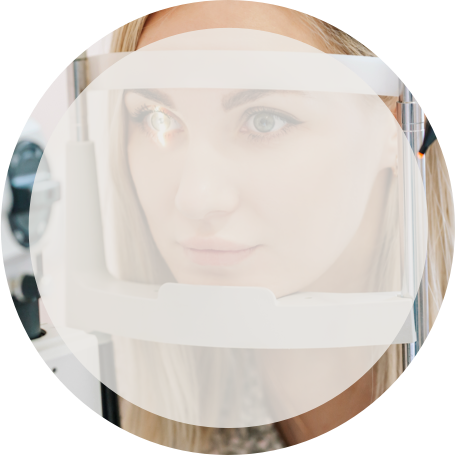
Specialized Care for Patients with Diabetes


Managing your diabetes can come with some unique challenges, especially when it concerns your eyesight. Diabetes can affect your eye health and increase your risk of eye diseases. Complications with these conditions can put you at risk for vision loss.
The good news is regular eye exams can help detect and address issues before they escalate. Our experienced team is dedicated to providing thorough eye care tailored to your needs.
Schedule a diabetic eye exam with us today! We have 4 convenient locations in Baden, Cranberry, Mt. Oliver, and Wexford. Take control of your eye health and maintain clear vision for years to come.

What to Expect During a Diabetic Eye Exam
During your diabetic eye exam, we’ll conduct a series of tests to assess your vision and eye health. This includes dilating your pupils to get a clear view of the retina and optic nerve and checking for signs of diabetic retinopathy or other complications.
We aim to provide a comprehensive evaluation to detect any issues early and discuss the best course of action to protect your vision.
How Often Do I Need to Get a Diabetic Eye Exam?
The American Diabetes Association recommends patients with diabetes receive an annual eye exam. Depending on your family history, we may recommend a more frequent schedule, but we’ll discuss this with you during your first eye exam with us.
High blood sugar levels can damage blood vessels in your eyes. Diabetes can lead to several eye diseases, which develop without noticeable symptoms in their early stages.
Regular eye exams enable early detection and management, helping to prevent vision loss. By monitoring your eye health consistently, we can identify changes promptly and protect your sight.

Our Diagnostic Technology
We use innovative technology to thoroughly examine your eyes and help us identify any complications that may arise from diabetes. Many eye diseases and conditions don’t have early warning signs, so early diagnosis is crucial.
Diabetes can also increase your risk of developing cataracts and glaucoma. Our goal is to protect your eye health and vision, and we use electroretinography and optical coherence tomography angiography.
Electroretinography or an electroretinogram (ERG) is a noninvasive diagnostic test. We’ll measure the electrical activity in your retina (back of the eye). The results of this test can help identify signs of diabetic eye disease.
Optical coherence tomography angiography (OCT-A) is a noninvasive imaging tool used to capture detailed images of the retina (back of the eye). It helps us identify signs of eye disease, including diabetic retinopathy, glaucoma, and age-related macular degeneration.

Diabetic Eye Diseases
Diabetic eye disease is an umbrella term for a number of eye issues that can be caused by diabetes. The two most common diabetic eye diseases are:
- Diabetic retinopathy
- Diabetic macular edema
People with diabetes are also at a higher risk of developing cataracts (clouding of the lens of the eye) and glaucoma (an increase in pressure in the eye, causing damage to the optic nerve).
Diabetic Retinopathy
Diabetic retinopathy occurs when the blood vessels in your retina (back of the eye) swell and leak. Fluid and blood enter the eye, causing patients to see dark spots or cobweb-like streaks in their vision.
Managing your blood sugar is crucial. Having high blood sugar for long periods of time can damage the blood vessels in your eyes, causing potential vision loss if left untreated. Later stages of this disease can cause abnormal blood vessels to grow, which easily leak fluid or bleed.
Diabetic Macular Edema
Diabetic macular edema is when blood vessels leak into the macula (the part of your eye responsible for central vision). It develops due to complications with diabetic retinopathy.
The macula swells because fluid leaks from the blood vessels into the eye. If left untreated, diabetic macular edema can cause permanent vision loss.

Caring for Your Diabetes & Eye Health
Our team is committed to supporting your eye health as you manage diabetes. Regular eye exams are a proactive step toward preventing vision complications. Schedule your diabetic eye exam with us today!
Neurolens: Relief for Eye Strain & Headaches
Do your eyes feel exhausted after a long day looking at screens? Does your neck ache, or do you get frequent headaches? We want to help!
Neurolens glasses are designed to correct subtle misalignments in your eyes that can cause eye strain, headaches, light sensitivity, and aching shoulders. For many of our patients, the relief of wearing Neurolenses makes a major difference in their quality of life every single day.

Our Locations
Baden
We’re located at the corner of State Street and Holmes Avenue next to the United States Post Office.
Our address
- 400 State St.
- Baden, PA 15005
Contact Us
- 724-869-1870
- 724-869-8113
Our Hours
Cranberry
Find us on Robinhood Drive, just off Rochester Road. If you have any trouble finding us, feel free to give us a call.
Our address
- 4 Robinhood Dr.
- Cranberry Township, PA 16066
Contact Us
- 724-776-3033
- 724-776-3059
Our Hours
Wexford
Our Wexford office is located in the Pine Center Plaza off the 11279 Perry Highway.
Our address
- 11279 Perry Hwy Suite 309
- Wexford, PA 15090
Contact Us
- 724-940-0150
- 724-940-0244
Our Hours
Mt. Oliver
Find us on Brownsville Road across from the Firehouse. Give us a call if you have any trouble locating our office.
Our address
- 119 Brownsville Rd.
- Pittsburgh, PA 15210
Contact Us
- 412-381-7600
- 412-381-5015
Our Hours
*We’re open every other Saturday from 8:00 AM–12:00 PM and closed Sundays.














